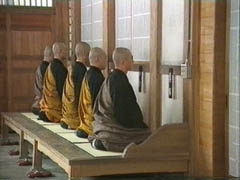( Dogen’s Instructions for the Cook – XXVIII)
We continue with Master Dogen’s Tenzo Kyokun …
Today, I happened to hear from a couple of people who were disappointed by someone in their lives … friends, family members, co-workers who let them down a bit.
Master Dogen provides a good perspective on this …
Also, know how to stand beyond opinions of right and wrong …
We cannot always control what other people do to us … but we have control over how we react to what other people do.
Suppose we areout on a lake and it’s a bit foggy-not too foggy, but a bit foggy-andwe’re rowing along in our little boat having a good time. And then, allof a sudden, coming out of the fog, there’s this other rowboat and it’sheading right at us. And…crash! Well, for a second we’rereally angry-what is that fool doing? I just painted my boat! And herehe comes-crash!-right into it. And then suddenly we notice that therowboat is empty. What happens to our anger? Well, the angercollapses…I’ll just have to paint my boat again, that’s all. But ifthat rowboat that hit ours had another person in it, how would wereact? You know what would happen! Now our encounters with life, withother people, with events, are like being bumped by an empty rowboat.But we don’t experience it that way. We experience it as though thereare people in that other rowboat and we’re really getting clobbered bythem. …
Do notdiscriminate between the faults or virtues of the monks or whether they aresenior or junior. You do not even know where you stand, so how can you putothers into categories. Judging others from within the boundaries of your ownopinions, how could you be anything other than wrong? Although there aredifferences between seniors and juniors [
andsome have wisdom while others are foolish or dim], all are equally members of theassembly. Those who had many faults yesterday may be correct and clear today.Who can judge "sacred" from "common." The Zen MonasticStandards states, "Whether foolish or wise, the fact that one trains asa monk provides for others a gift that penetrates everywhere."
If you stand beyond opinions of right and wrong, you bring forth the practiceof actualizing unsurpassable Awakening. If you do not, you take a wrong stepand miss what's there. The bones and marrow of the ancients was just theexertion of such practice and those monks who train as tenzo in the futurerealize the bones and marrow of the Way only through just such exertion. Themonastic rules set forth by great master Baizhang must always be maintained.
From: Tenzo Kyokun - Instructions for the Cook by Eihei Dogen -
Translated by Yasuda Joshu and Anzan Hoshin
